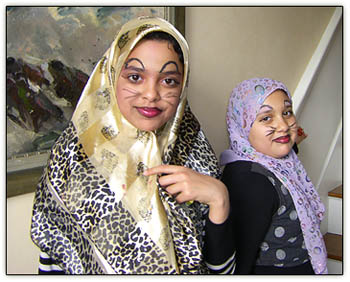With its lure of endless amounts of candy and the chance to dress up as a favorite superhero or princess, Halloween has often been seen a source of strife for Muslim families, finding it so difficult for youngsters to resist.
For parents, many of them have grown weary of saying no to yet another opportunity for their children to have fun with their friends.
In fact, it’s no wonder some Muslim parents have even resorted to their own Halloween tricks when it comes to dissuading their children’s participation.
“Halloween is Shaytan’s birthday,” said Marwa Syed, 9. “That’s what my dad told me.”
Also Read: Be Careful of the Trap of Deploying Peacekeeping Forces to Gaza
Is this the best way to handle the Halloween problem? Many parents don’t think so and choose to simply explain to their kids why they won’t be knocking on neighbors’ doors in their quest for candy.
“We don’t celebrate Halloween,” said Fatimzahra Ahmed, a mother of two young boys who lives in Texas but who is originally from Morocco.
“Last year I took them trick-or-treating, but this year I told them they can get candy any time of the year so there is no need for costumes or anything like that.”
Still, even those who shun the holiday feel the pressure. “I did buy them costumes for them to wear to school,” Ahmed told On Islam.
Also Read: The Forty-Four-Days of Glory: Azerbaijan’s Struggle for Justice and Peace
For Marie Johnson, who grew up in the United States, her perspective on her children’s Halloween participation has changed as her kids have grown.
“For years we didn’t do anything for Halloween until my daughter was eight,” said Johnson, mother to 10-year-old Iman and 5-year-old Ali.
“At that time she started to feel really left out, and we decided that dressing up and going door-to-door for candy wasn’t a big deal.”
Ironically, Johnson said it was for the sake of Islam that she and her husband gave in to their daughter’s wishes and now allow her and her younger brother to take part in Halloween.
Also Read: Palestine Solidarity Month: A Collective Movement for Al-Aqsa and Palestine’s Freedom
“For us it was more a matter of her not hating her religion because she saw other people doing fun stuff and she couldn’t do it,” she said.
However, Johnson stressed they set limits regarding how much celebrating goes on in their home.
“We do the least amount that we can to let our kids feel included,” she said. “We don’t decorate our house or give out candy ourselves.”
Other Muslims are not content to agree with Johnson’s view of Halloween, many claiming that to celebrate it is akin to practicing paganism or devil worship.
Also Read: Hassan al-Turabi: A Controversial Thinker from Sudan
Johnson said she is aware that not everyone agrees with her take on the holiday.
“I think that if your intention is you’re not worshipping the devil or practicing paganism, then you’re not,” Johnson said.
“To me, it’s just kids getting dressed up and getting candy, but I realize that not everyone agrees with me on that.”
However, to make sure her children understand the importance of Islam, Johnson said she and her husband have explained the religious significance of `Eid al-Fitr and `Eid al-Adha. The Islamic holidays are also accompanied by lots of gifts and fun of their own.
Also Read: Who Exactly is the RSF Group Shaking Sudan?
Some parents allow their children to participate in Halloween because, as Ahmed put it, “It’s a cultural holiday with no religious association.”
However, although Halloween is in no way linked with Islam, the holiday does have a spiritual link to Christianity.
It’s widely accepted that Halloween began as the Eve of Samhain, an occasion to mark the beginning of winter and the first day of the new year for pagans living in the British Isles.
These people also believed October 31 was the day that the lord of the dead gathering the souls of those who had died during the previous year and that their souls would take over the body of animals.
Also Read: The Two-State Solution (Palestine–Israel) in Historical Perspective
When Christianity came to this land, the October 31 holiday was changed and subsequently came to honor Christian saints. It was named the Feast of All Saints.
Though the change was successful, many aspects of the Samhain festival were preserved and eventually integrated into modern-day Halloween traditions.
Because of these origins, most Islamic religious scholars would not consider Halloween, its rituals and celebrations in line with Muslim teachings.
Of course, muslim/">American Muslim parents are encouraged to conduct their own research and come to their own informed decision about how to handle Halloween and concluding what is best for their family. (P006/R03)
Also Read: Enchanted by K-Dramas, Dragged into Slander: Time for Muslims to Rise!
Taken from OnIslam
Mi’raj Islamic News Agency (MINA)
Also Read: Creating Opportunity and Avoiding Misery; Lesson Learn on Waste Recycling Issue





































 Mina Indonesia
Mina Indonesia Mina Arabic
Mina Arabic